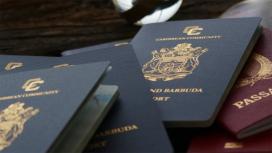Blog • Published on:May 28, 2025 | Updated on:May 28, 2025 • 15 Min
A Complete Guide to Türkiye’s Tax System for Residents and Investors
Thinking about living, investing, or building a business in Türkiye? Then your tax game needs to be sharp from day one. Whether you're picking up property in Bodrum or launching a startup in Istanbul, how you’re taxed, and where you can save, matters.
In 2025, Türkiye’s tax system isn’t what it used to be. A 10% minimum corporate tax now applies across the board, even for companies that used to enjoy exemptions. And if your global business earns over €750 million, you're now facing a 15% global minimum tax, aligned with new OECD rules.
Personal income tax is still progressive, but with updated brackets ranging from 15% to 40%. And whether you’re taxed on local or global income all depends on your residency status.
So, what does that mean for you? Is real estate still tax-friendly? Do Free Zones give you an edge? Can citizenship by investment come with perks?
Let’s break it down.
Understanding Türkiye’s Tax System
Türkiye operates on a centralized tax system, meaning most taxes are collected and regulated by the central government through the Revenue Administration (Gelir İdaresi Başkanlığı). There are some local taxes, particularly those related to property and municipal services, but the bulk of fiscal duties are nationally managed.
The Turkish tax system includes three core categories:
These are applied differently depending on whether you're a resident, non-resident, business owner, or investor.
Who runs Türkiye’s tax system?
The Revenue Administration is the main authority overseeing all tax matters in Türkiye. It is part of the Ministry of Treasury and Finance and is responsible for:
- Implementing tax laws
- Collecting taxes
- Monitoring compliance
- Providing taxpayer services
- Issuing guidance and rulings
All individuals and entities interact with this authority through regional tax offices or the national e-Tax portal (İnteraktif Vergi Dairesi).
What is the fiscal year in Türkiye?
Türkiye’s fiscal year follows the calendar year, starting on January 1 and ending on December 31. All annual tax returns, whether personal or corporate, are filed based on this period.
- Personal income tax returns: Submitted between March 1–31 each year.
- Corporate tax returns: Due by the end of April for the previous year.
What’s unique about Türkiye’s tax system in 2025?
Several notable features set Türkiye apart:
- A 10% minimum corporate tax now applies even to previously exempt firms (introduced in late 2024).
- Multinational companies with global revenue above €750 million must meet a 15% global tax rate, under OECD alignment.
- Increasing digitization of the tax system: nearly all filings, payments, and interactions can now be done online via the national portal.
- A growing number of tax incentive zones and sector-specific breaks, especially in tech, renewable energy, and real estate.
These changes reflect Türkiye’s dual goals of staying internationally competitive while ensuring domestic compliance.
Types of Taxes in Türkiye
Türkiye’s tax system revolves around several core taxes, each applied depending on income type, activity, or asset class. Here's how they work in 2025:
Personal Income Tax Rates and Brackets
How is personal income taxed in Türkiye?
Personal income tax in Türkiye is progressive, meaning your tax rate increases as your income rises. This applies to employment income, business profits, rental income, capital gains, and other earnings.
2025 Personal Income Tax Brackets
- Non-residents are taxed only on income earned within Türkiye.
- Residents are taxed on their worldwide income.
Corporate Tax Regulations
What is the corporate tax rate in Türkiye?
In 2025, the standard corporate tax rate is 25%. However:
- Banks and financial institutions are taxed at 30%.
- Minimum tax floor: Even companies with tax exemptions now pay a minimum 10% corporate tax.
Who pays corporate tax?
Any legal entity operating a business in Türkiye, including foreign-owned companies, is subject to corporate taxation. That includes:
- Joint stock companies (AŞ)
- Limited liability companies (Ltd. Şti.)
- Foreign branches
- Certain partnerships
Value Added Tax (VAT)
VAT (Katma Değer Vergisi – KDV) is applied to the supply of goods and services, and importation of goods.
VAT Rates in 2025
Some transactions, such as exports, international transportation, and certain educational or cultural services, are VAT-exempt.
Property and Real Estate Tax
Do property owners pay tax?
Yes. Real estate tax (Emlak Vergisi) applies to both land and buildings, with rates varying based on location and property type.
- Municipalities in major cities (like Istanbul, Ankara) apply double rates.
- There’s also a title deed transfer tax of 4%, typically split 50/50 between buyer and seller.
Capital Gains Tax
What capital gains are taxed?
Capital gains on property sales, stock transactions, and business asset disposals are subject to tax, depending on the holding period and source of income.
- Property sold within 5 years of acquisition: taxed as personal income.
- Gains from publicly traded shares held over 2 years: exempt.
- Other financial gains: taxed at 15% to 40%, depending on total annual income.
Tax Residency in Türkiye
How is tax residency determined in Türkiye?
Your tax residency status decides whether you pay tax on just your Turkish income, or your worldwide income.
In Türkiye, you are considered a tax resident if:
- You reside in Türkiye for more than 183 days in any 12-month period, consecutively or intermittently.
- Or, you have established a “permanent home” in Türkiye (even if you're not present year-round).
Important: Residency is assessed based on actual presence, not just visa status or citizenship. Even tourists or digital nomads can become tax residents unintentionally if they stay too long.
What are the tax obligations for residents?
Residents are taxed on their worldwide income, including:
- Employment earnings (domestic and foreign)
- Dividends and interest income
- Rental income from overseas properties
- Capital gains from global assets
They are also required to:
- Register with a local tax office
- Obtain a Turkish Tax ID Number
- File annual income tax returns if applicable
If you’re self-employed, run a business, or own rental property, you must declare your income through periodic returns (monthly or quarterly) depending on your activity.
What are the tax rules for non-residents?
Non-residents are only taxed on Türkiye-sourced income, such as:
- Income from a Turkish employer
- Rental income from Turkish properties
- Dividends from a Turkish company
- Capital gains from Turkish assets
They do not pay tax on:
- Income earned abroad
- Foreign dividends, interest, or capital gains
Tip: Many investors intentionally maintain non-resident status to avoid worldwide taxation, especially if they own Turkish property but live elsewhere.
Türkiye Citizenship by Investment and Tax Benefits
What are the investment options for Turkish citizenship in 2025?
As of 2025, Türkiye offers several pathways for investors seeking citizenship through financial contributions:
These options are designed to attract foreign investment and stimulate economic growth within Türkiye.
What are the tax implications for investors under the CBI program?
Investors who acquire Turkish citizenship through the Citizenship by Investment (CBI) program can benefit from several tax advantages:
- No Tax on Worldwide Income: Türkiye does not tax foreign-sourced income for residents, meaning income earned outside of Türkiye is not subject to Turkish taxation.
- No Wealth or Inheritance Tax: There are no taxes on wealth or inheritance, providing a favorable environment for estate planning.
- Capital Gains Tax: Capital gains from the sale of real estate are exempt from taxation if the property is held for more than five years.
- Rental Income Tax: Rental income from Turkish properties is subject to income tax, with rates ranging from 15% to 40%, depending on the amount.
- Property Tax: Annual property tax rates range from 0.1% to 0.6%, depending on the type and location of the property.
These tax policies make Türkiye an attractive destination for investors seeking to optimize their tax liabilities.
Are there any residency requirements for CBI applicants?
No, Türkiye's CBI program does not require applicants to reside in the country before or after obtaining citizenship. There is also no requirement to learn the Turkish language or pass any cultural tests. This flexibility allows investors to maintain their primary residence elsewhere while enjoying the benefits of Turkish citizenship.
Corporate Taxation in Türkiye
How do you form a company and register for tax in Türkiye?
To operate a business legally in Türkiye, you’ll need to register a local entity, most commonly a Limited Liability Company (Ltd. Şti.) or Joint Stock Company (AŞ). Here’s how the process looks in 2025:
Note: VAT registration and employee social security registration are required for businesses involved in taxable trade or hiring staff.
What are deductible business expenses in Türkiye?
Businesses in Türkiye can deduct a wide range of ordinary, necessary, and documented expenses:
- Employee wages and insurance premiums
- Office rent, utilities, and communication costs
- Travel and accommodation (with receipts)
- Marketing, advertising, and digital promotions
- Equipment and vehicle depreciation
- Legal, accounting, and consultancy fees
- Bank interest and financing costs
- Research and Development (R&D) expenses
Net operating losses can be carried forward for up to 5 years but not carried back.
How are dividends taxed in Türkiye?
Dividends paid out by companies in Türkiye are subject to withholding tax, depending on the status of the shareholder:
Türkiye has double taxation treaties (DTAs) with more than 80 countries to help reduce or eliminate withholding on dividends, interest, and royalties.
What are the transfer pricing rules in Türkiye?
Transfer pricing rules are enforced for transactions between related parties, both domestic and international, and must follow the arm’s length principle (market value).
Key requirements:
- Maintain Local File and Master File for documentation.
- Submit annual transfer pricing reports with corporate tax return.
- Country-by-Country Reporting (CbCR) applies to multinational groups with €750 million+ in global turnover.
Türkiye aligns with OECD’s BEPS framework, meaning tighter scrutiny on multinationals shifting profits through related-party arrangements.
International Tax Agreements
Does Türkiye have double taxation treaties?
Yes. Türkiye has signed Double Taxation Avoidance Agreements (DTAs) with over 80 countries, including the UK, USA, Germany, Canada, UAE, Singapore, and many others.
These treaties ensure that taxpayers do not pay tax twice on the same income, once in the country where it is earned, and again in Türkiye.
What do DTAs typically cover?
- Business income
- Dividends
- Interest
- Royalties
- Capital gains
- Pensions
DTAs generally:
- Reduce or eliminate withholding tax on cross-border payments.
- Allow foreign tax credits in Türkiye for taxes paid abroad.
- Clarify which country has taxing rights in complex situations.
Example: A dual resident earning rental income in Germany may pay tax there but claim relief in Türkiye based on the treaty in place.
What are Türkiye’s Tax Information Exchange Agreements (TIEAs)?
Türkiye participates in the OECD’s Common Reporting Standard (CRS) and FATCA (for U.S. persons), which means:
- Financial institutions report account information of foreign nationals and residents to the Turkish tax authority.
- That data is automatically exchanged with the taxpayer’s country of origin (and vice versa).
What’s exchanged under CRS?
- Account balances
- Interest income
- Dividends
- Proceeds from asset sales
This makes offshore income more transparent, especially for those with undeclared foreign assets.
How is foreign income taxed in Türkiye?
It depends on your residency status:
If you are a tax resident of Türkiye and earn money abroad, you must:
- Declare it in your Turkish tax return.
- Claim a foreign tax credit if there’s a treaty.
- Submit documentation proving taxes paid abroad.
Important: If no DTA exists with the source country, double taxation may still occur unless planned properly.
Türkiye’s Position on Global Tax Transparency
In 2025, Türkiye is:
- A full member of the OECD Inclusive Framework on BEPS (Base Erosion and Profit Shifting)
- Committed to automatic exchange of information under CRS
- Adopting minimum global tax standards for large multinational companies (15% floor under OECD Pillar Two)
This means that cross-border investors, high-income earners, and international businesses need to be especially proactive in tax planning.
Tax Compliance and Reporting in Türkiye
What are the key tax filing deadlines in Türkiye?
Filing obligations vary based on whether you’re an individual or a company. Here are the main deadlines to keep in mind:
Individuals
Companies
Note: Returns must be filed through the İnteraktif Vergi Dairesi (Interactive Tax Office) portal. Paper submissions are no longer accepted for most filings.
How do you pay taxes in Türkiye?
There are several official payment channels for both residents and non-residents:
- Online through the Interactive Tax Office
- Mobile banking apps of most Turkish banks
- ATM payments using your Tax ID
- In-person at contracted banks or tax offices
All payments are tied to your Vergi Kimlik Numarası (Tax ID Number).
What happens if you miss a filing or payment?
Türkiye imposes strict penalties for late or incorrect tax filings:
Interest is calculated monthly on unpaid taxes and compounds over time. For frequent delays, the tax office may freeze bank accounts or initiate enforcement procedures.
Special Tax Zones and Incentives in Türkiye
What are Free Trade Zones in Türkiye?
Free Trade Zones (FTZs) are special economic areas designed to encourage export-oriented investment. Companies operating in these zones benefit from significant tax exemptions and streamlined regulatory processes.
Key Benefits in FTZs:
What are Investment Incentive Regions?
Türkiye is divided into six regional development zones, with increasing levels of incentives offered as you move to less developed regions.
Incentive Types by Region:
Investments in sectors like agriculture, machinery, renewable energy, and pharmaceuticals often qualify for enhanced support.
Are there tax benefits for R&D and innovation?
Yes. Türkiye offers strong fiscal incentives to companies involved in Research & Development, design, and software development.
R&D Tax Benefits:
Recent Tax Reforms and Changes
What is the Digital Services Tax in Türkiye?
Introduced in 2020 and still in effect in 2025, Türkiye’s Digital Services Tax (DST) applies to companies offering digital platforms and services to Turkish users, whether or not they have a local presence.
Key DST Details:
This is Türkiye’s version of what many countries are implementing globally, targeting Big Tech revenue streams generated from local markets.
What are Environmental (Green) Taxes?
In line with EU-aligned climate goals, Türkiye has introduced and expanded environmental taxes to encourage sustainability and reduce carbon emissions.
Examples of Environmental Taxes in 2025:
These measures are part of Türkiye’s Green Transformation Plan, which includes investment incentives for clean energy and energy-efficient technologies.
Which COVID-19-related tax measures are still active?
While most pandemic-specific policies have been phased out, a few residual support mechanisms remain in place for vulnerable sectors in 2025:
- Deferred Tax Payments: Some sectors (tourism, events) are still allowed to restructure overdue taxes in instalments.
- Reduced VAT: Certain goods and services (e.g., food, hygiene products, books) continue to benefit from temporary VAT cuts introduced during COVID, now extended through 2025.
- Workforce Subsidies: Social security premium support for companies that retained staff during lockdown periods remains available in specific provinces.
While COVID may no longer be a pressing fiscal issue, the aftershocks are still visible in ongoing stimulus-linked incentives.
Practical Guide for Tax Planning in Türkiye
What are smart tax optimization strategies in Türkiye?
If you're living, investing, or running a business in Türkiye, these strategies can help you stay efficient and compliant:
1. Use Regional Incentives Strategically
- Set up your business in development Region 5 or 6 to qualify for up to 90% corporate tax reductions.
- Consider Free Trade Zones if your operation is export-driven, zero corporate tax + income tax exemptions on staff wages.
2. Maximize Deductibles
- Track every business-related expense: travel, software, legal fees, and R&D costs can all reduce your taxable income.
- For individuals: deduct eligible costs related to rental property maintenance and education/healthcare expenses.
3. Hold Real Estate for 5+ Years
If you’re investing in property, keep it for more than 5 years to qualify for capital gains tax exemption on resale.
4. Leverage Foreign Income Status
- If you're a non-resident, structure your income so that it's earned outside of Türkiye, you won’t be taxed on foreign earnings.
- If you're a resident with income from countries with tax treaties, claim foreign tax credits to avoid double taxation.
5. Choose the Right Corporate Form
- A Limited Company (Ltd. Şti.) may offer simpler compliance and lower overhead costs for small to mid-size operations.
- Large-scale investors may prefer an AŞ (Joint Stock Company) for capital raising and international credibility.
What To Do Next: Planning Your Taxes in Türkiye
Whether you're moving to İstanbul for a better lifestyle, setting up a tech company in Izmir, or buying real estate in Antalya to qualify for citizenship, your tax plan should never be an afterthought.
Türkiye offers a wide range of strategic opportunities: from regional tax breaks and R&D incentives to capital gains exemptions and global income flexibility for non-residents. But these benefits only work when you structure things correctly from day one.
In 2025, the Turkish government continues to push for transparency, digitalization, and global alignment with OECD standards. This means more scrutiny, but also more predictability. If you’re thinking long-term, building a compliant and tax-efficient presence in Türkiye isn’t just possible, it’s practical.
Considering Turkish Citizenship through Investment? Explore the official route with Savory & Partners to get full supports through every step of the process with accuracy and confidentiality.
FAQs on Taxation and Citizenship in Türkiye
1. Do I need to live in Türkiye to be taxed on my income?
Not always. You're only taxed on your worldwide income if you're considered a tax resident, meaning you spend more than 183 days in Türkiye within any 12-month period or maintain a permanent residence there. Otherwise, only your Türkiye-sourced income (like rental or business income in Türkiye) is taxed.
2. Is rental income from Turkish property taxable?
Yes. If you rent out property in Türkiye, you're taxed on the net rental income at progressive rates from 15% to 40%. Expenses like maintenance, depreciation, and property management fees may be deductible. This applies whether you're a resident or a non-resident.
3. Can I avoid capital gains tax on property?
Yes, if you hold the property for more than 5 years, any capital gain from the sale is exempt from taxation in Türkiye. This rule applies to individuals and can significantly reduce your tax liability when investing in real estate for long-term gain or citizenship.
4. Are foreign salaries taxed in Türkiye?
Only if you're a tax resident. If you’re classified as a resident and earn income abroad, that income is taxable unless it's exempt under a double taxation treaty. Non-residents, however, are not taxed on foreign salaries or offshore investment income.
5. What taxes do I pay if I become a citizen through investment?
Citizenship doesn’t automatically trigger full tax obligations. If you don't live in Türkiye or earn Turkish income, you won't owe personal taxes. But if you start a business, receive local rental income, or reside full-time, you'll be taxed like any Turkish national based on your activity and residency status.
References
Presidency of the Republic of Türkiye Investment Office. (2025). Investment Guide: Taxation in Türkiye. Retrieved from https://www.invest.gov.tr/en/library/publications/lists/investpublications/investment-guide-turkiye.pdf
Turkish Revenue Administration (Gelir İdaresi Başkanlığı). (2025). Taxpayer Guide for Foreigners. Retrieved from https://www.gib.gov.tr/
Ministry of Treasury and Finance, Republic of Türkiye. (2024). Corporate Tax Law No. 5520 (Latest Amendments). Retrieved from https://ms.hmb.gov.tr/
OECD. (2025). Türkiye’s Implementation of BEPS Minimum Standards. Retrieved from https://www.oecd.org/tax/beps/
Turkish Free Zones General Directorate. (2024). Free Zones in Türkiye: Investor Incentives and Legal Framework. Retrieved from https://www.ticaret.gov.tr/serbest-bolgeler
Written By

Alice Emmanuel
Alice Emmanuel is an expert in residency and citizenship by investment, specializing in government compliance and program optimization. With over 8 years of experience, she has guided high-net-worth individuals through acquiring global mobility and new citizenships, particularly in Europe, the Caribbean, and the Middle East. Alice's in-depth knowledge of Middle Eastern residency programs makes her a trusted advisor for investors seeking security and diversification in the region.
Related Articles









Recently Published









Book a free consultation


